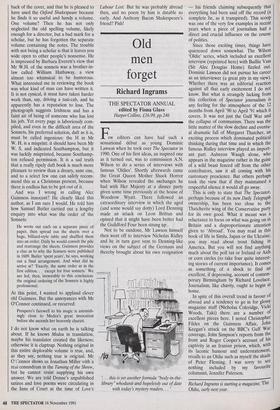Old men forget
Richard Ingrams
THE SPECTATOR ANNUAL edited by Fiona Glass Harper Collins, £16.99, pp.246 Few editors can have had such a sensational debut as young Dominic Lawson when he took over The Spectator in 1990. One of his first ideas, an inspired one as it turned out, was to commission A.N. Wilson to do a series of interviews with famous 'Oldies'. Shortly afterwards came the Great Queen Mother Shock Horror when Wilson revealed the exchanges he had with Her Majesty at a dinner party given some time previously at the house of Woodrow Wyatt. There followed an extraordinary interview in which the aged (and some would say dotty) Lord Denning made an attack on Leon Brittan and opined that it might have been better had the Guildford Four been strung up.
Not to be outdone, Mr Lawson himself then went off to interview Nicholas Ridley and he in turn gave vent to Denning-like views on the subject of the Germans and thereby brought about his own resignation
`. . . this is yet another formula "body-in-the- library" whodunit and hopelessly out of date with today's mystery readers. . . '
— his friends claiming subsequently that everything had been said off the record (a complete lie, as it transpired). This scoop was one of the very few examples in recent years when a piece of journalism had a direct and crucial influence on the course of politics.
Since those exciting times, things have quietened down somewhat. The Wilson 'Oldie' series, which included an excellent interview (reprinted here) with Baillie Vass (Sir Alec Douglas Home) fizzled out. Dominic Lawson did not pursue his career as an interviewer (a great pity in my view). Whether there was an editorial reaction against all that early excitement I do not know. But what is strangely lacking from this collection of Spectator journalism is any feeling for the atmosphere of the 12 months from April '90 to April '91 which it covers. It was not just the Gulf War and the collapse of communism. There was the little matter of the slow decline and eventu- al dramatic fall of Margaret Thatcher, an exciting process which dominated political thinking during that time and in which the famous Ridley interview played an import- ant part. Auberon Waugh alone, who appears in the magazine rather in the guise of a wild beast fenced off from the other contributors, saw it all coming with his customary prescience. But others perhaps took the view that if they maintained a respectful silence it would all go away.
This is only to state that The Spectator, perhaps because of its new Daily Telegraph ownership, has been too close to the Thatcherite wing of the Conservative party for its own good. What it meant was a reluctance to focus on what was going on in Britain and a disproportionate attention given to 'Abroad'. You may read in this book of life in Simla, Japan or the Ukraine; you may read about trout fishing in America. But you will not find anything much about the poll tax or Ireland or Aids or corn circles (to take four quite interest- ing stories of current importance). It comes as something of a shock to find an excellent, if depressing, account of contem- porary Birmingham by Richard Lovelace. Journalism, like charity, ought to begin at home.
In spite of this overall trend in favour of abroad and a tendency to go in for glossy magazine stuff (Nicholas Coleridge, Vicki Woods, Taki) there are a number of excellent pieces here. I noted Christopher Fildes on the Guinness Affair, John Keegan's attack on the BBC's Gulf War coverage, John Simpson's reports from the front and Roger Cooper's account of his captivity in an Iranian prison, which, with its laconic humour and understatement, recalls to an Oldie such as myself the shade of Peter Fleming. I was sorry to see nothing included by my favourite columnist, Jennifer Paterson.
Richard Ingrams is starting a magazine, The Oldie, early next year.










































































 Previous page
Previous page